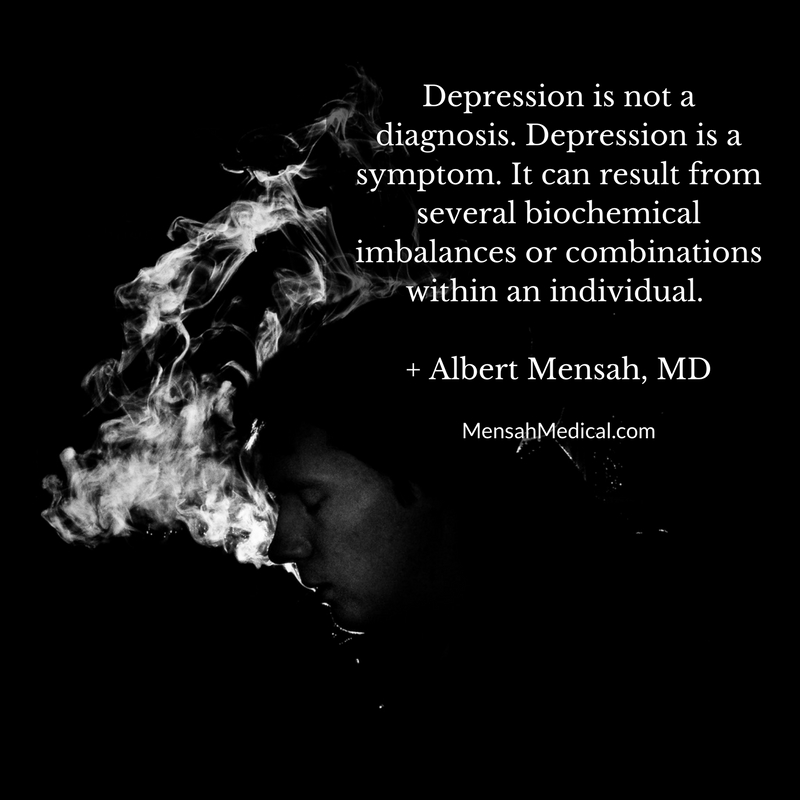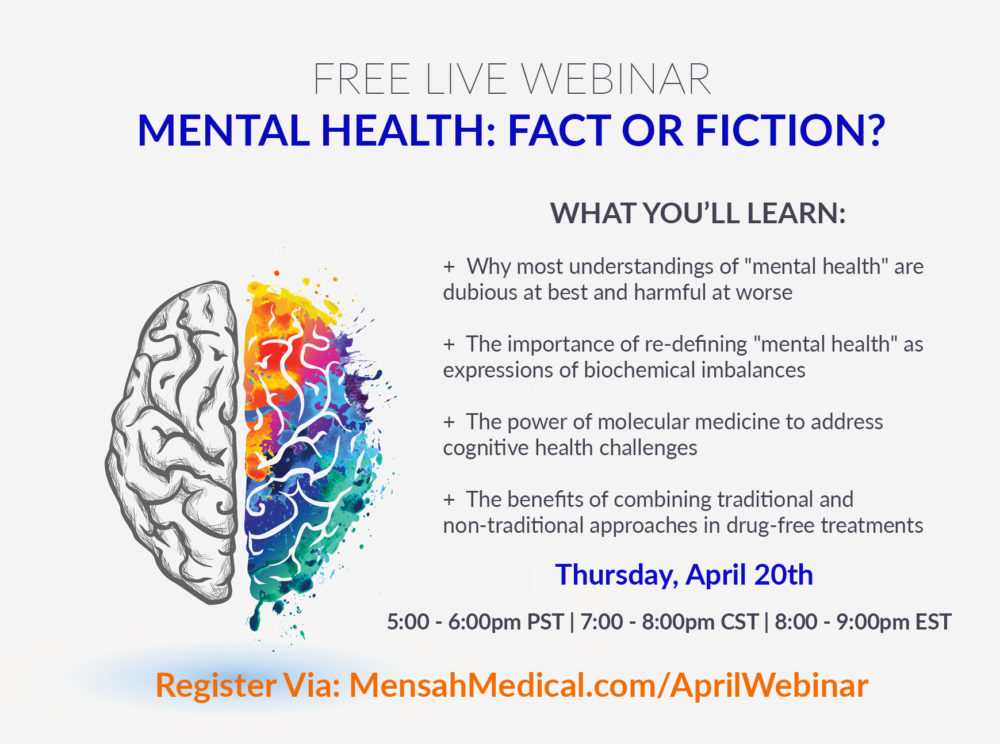Every doctor knows that medications do not fix mental health conditions. We are taught that prescription medications, in general, serve only as a band-aid. It was believed that these treatments could not heal mental conditions because we did not know the true cause of mental health problems.
The groundbreaking work of the medical doctor and researcher, Dr. Carl Pfeiffer, MD, Ph.D. countered the idea that the source of mental health problems was unknown when he identified many of the root cause and effect mechanisms of various mental conditions. Pfeiffer’s research revealed the importance of one’s biochemistry – as opposed to strictly environment and experiences – in healing mental health challenges like anxiety, depression, bipolar disorder, schizophrenia, ADD/ADHD, and more. The ongoing work of Dr. William Walsh, Ph.D., who studied with Carl Pfeiffer, created a paradigm shift that further established brain chemical imbalances as meaningful causes of various mental health conditions.
The “Mental” in Mental Health is Misleading
Mental health, in fact, is a misnomer. The term “mental” in mental health derives from the Latin word “mens,” meaning: of or relating to the mind. This definition represents the fundamental problem with the phrase “mental health.” What most people consider “mental health” problems are often not matters of mental health, but brain health. To understand what makes the distinction critical, let’s discuss the language further.
The brain and the mind are not the same. The brain is an organic structure composed of nerve cells, interstitial tissue, blood vessels, support cells known as glia, and myriad chemical elements from neurotransmitters to necessary metals, ions, and nutritive fluids. In other words, the brain is perhaps the most intricate physical organ structure known to man.
The mind, on the other hand, incorporates the processing of the brain but is far greater than the sum of the parts of the brain itself. This is why, for example, you may feel emotional pain because of something someone said to you, even though the brain itself has not been touched or damaged. A traumatic experience can mentally affect you for extended periods of time, but your brain can continue to function undisturbed.
Alternatively, people maintain a certain level of mental awareness even when swelling in the brain can lead to coma. Many people who have been in comas speak of having consciousness of the people around them while in this state, despite the brain’s functional paralysis.
Rethinking the Role of the Brain and Biochemistry Means Fundamentally Rethinking Mental Health
What people label “mental health” conditions are more often problems of the brain than of the mind. We now understand that several biochemical causes can each individually produce the symptom of anxiety. For example, low zinc levels inhibit the normal production of balanced neurotransmitters including serotonin and dopamine. When this occurs, neurons fail to communicate properly with each other, which prevents your nerve cells and brain from efficiently working together. When these biochemical shifts persist, the symptom of anxiety can occur.
In this sense, the symptom of anxiety is not a “mental” problem, but one that stems from the brain. Our bodies need proper concentrations of certain nutrient elements to allow for balanced and directional nerve-to-nerve communication. When your brain is dysfunctional – in this example, because of poor neuron-to-neuron communication – your mind has difficulty being completely functional. However, when chemical imbalances are corrected, normal mental processing can occur. In the case of anxiety, when nerve-to-nerve communication is addressed, a greater sense of peace, and ease can occur.
Many Mental Conditions Are Not Treated Effectively
Better understanding the relationship between the brain and the mind has significant implications for treatment. At Mensah Medical we think of challenges like anxiety and depression, not as diagnoses, but as symptoms. More specifically, they are symptoms of an underlying biochemical imbalance that has expressed itself in the emotions and sensations associated with mental conditions like anxiety, depression, bipolar disorder, schizophrenia, and more.
Medical science did not understand the importance of chemical imbalances in shaping conditions like anxiety, depression, bipolar disorder, schizophrenia, and other issues. Because medical researchers and practitioners, did not – and many still do not – consider the role of one’s biochemistry in creating mental and emotional experiences, chemical imbalances are often misdiagnosed as “mental health” problems.
Because these imbalances are typically not known or considered, the cause of conditions like anxiety and depression are often attributed to environmental stress or emotional trauma. As a result, treatment has typically taken the form of drugs to manipulate neurotransmitters, cognitive therapy, and psychological probing of one’s past and present environment. While there is validity in many of these approaches, they do not address the foundational biochemical imbalance that often produces these symptoms.
When it is understood that the main concern is not always mental health, but biochemical imbalances, we can target the primary cause of various mental conditions central to producing both biochemical correction and mental and emotional healing. By redefining mental health issues as matters of molecular disarrangement, we can provide a more comprehensive approach to evaluate, treat, and correct conditions like bipolar disorder, depression, autism, and more.

Medical science did not understand the importance of chemical imbalances in shaping conditions like anxiety, depression, bipolar disorder, schizophrenia and other issues. Because medical researchers and practitioners, did not – and many still do not – consider the role of one’s biochemistry in creating mental and emotional experiences, chemical imbalances are often misdiagnosed as “mental health” problems.
Because these imbalances are typically not known or considered, the cause of conditions like anxiety and depression are often attributed to environmental stress or emotional trauma. As a result, treatment has typically taken the form of drugs to manipulate neurotransmitters, cognitive therapy and psychological probing of one’s past and present environment. While there is validity in many of these approaches, they do not address the foundational biochemical imbalance that often produces these symptoms.
When it is understood that the main concern is not always mental health, but biochemical imbalances, we can target the primary cause of various mental conditions central to producing both biochemical correction and mental and emotional healing. By re-defining mental health issues as matters of molecular disarrangement, we can provide a more comprehensive approach to evaluate, treat and correct conditions like bipolar disorder, depression, autism and more.
Molecular Medicine Addresses the Unique and Fundamental Causes of Mental Conditions

The science of Molecular Medicine involves searching for and correcting several biochemical imbalances, one of which is methylation. Methyl molecules are responsible for influencing gene expression and regulating enzymes, hormones, and neurotransmitters.
Too much or too little methyl can significantly influence mental and emotional states. If one does not have enough methyl, they can experience emotionally impaired states such as anxiety, depression, mood swings, and poor focus and attention. At the same time, someone who produces too much methyl can experience the exact same symptoms by name, but not by cause. This is why treatments for broadly defined conditions like anxiety and depression, may help some people but not others.
To illustrate, there are three states of methylation:
1.) Undermethylation, low concentration of methyl
2.) Normal levels of methylation
3.) Overmethylation, high levels of methyl molecules in the system
Both an under-methylator and an over-methylator can experience symptoms associated with depression. However, the chemical rebalancing protocol is very different for each. In the case of an over-methylator, treating their depression would involve strategies to remove methyl. Conversely, in the case of an under-methylator, the rebalancing protocol would involve strategies to increase methyl concentration.
Where Medicine Must Go
Mensah Medical addresses the root causes of many so-called “mental health” issues by examining and targeting biochemical imbalances for treatment and correction. Unfortunately, this approach is only now gaining more attention. Much of medicine is still rooted in the mysticism associated with “mental health,” not recognizing the nature of biochemical dis-regulation.
We must reprogram our minds to look for the fundamental biochemical causes, as opposed to environmental factors alone, which affect alleged “mental health” challenges. In the words of one of my mentors, “The eyes cannot see what the mind does not know.” Mensah Medical’s predecessor, Dr. Carl Pfeiffer, MD, Ph.D., sought an explanation for the failure of medicine in so-called “mental health” and uncovered the centrality of biochemistry.
Building upon the knowledge and wisdom of both Dr. Carl Pfeiffer and Dr. William Walsh, Ph.D., we now recognize the urgent need to explore a patient’s biochemistry in addition to non-biological and environmental circumstances. Still, there is a place for both conventional and non-traditional approaches. At Mensah Medical, we appreciate the roles of both environment and chemistry.
Let’s explore these concepts further together. Join me for the free live webinar “Mental Health: Fact or Fiction?” Thursday, April 20th.
We’ll explore answers to any questions you may have about this article and your own experiences. Register at: www.MensahMedical.com/AprilWebinar




